- About Ramapo
- Academics
- Admissions & Aid
- Student Life
- Athletics
- Alumni
- Arts & Community
- Quick Links
- Apply
- Visit
- Give
Educators and Schools
Holocaust and Genocide Educator Workshops
The Center organizes daylong pedagogical workshops, in most semesters, for teachers and other educators who have taken on the weighty responsibility to instruct students and the public in the history of the Holocaust and genocide. The format and theme will vary from semester to semester. While we require advanced registration, we offer our workshops without charge as a service to the regional community and to the future. Professional development credits are available.
We thank the Gumpert Family Foundation for supporting our teacher-training activities.
View the curriculum developed by the NJ Commission on Holocaust Education
Preparing for America at 250 Years: Indigenous History and Contemporary Life
Fall 2025 Holocaust and Genocide Educator Workshop
Thursday, December 18, 2025 from 8:30 am – 2:30 pm
Trustees Pavilion One and Two
We provide our semesterly workshops at no cost to regional educators. Breakfast and lunch will be served, along with coffee throughout the day. Professional development credits are available through the NJ Commission on Holocaust Education.
When students learn about Native American history, they often focus on events that took place in the West. But New Jersey is home to a dynamic and still-ongoing Native history! Our workshop will expose educators to new pedagogies and content materials related to Native American history with a local focus. Participants will enjoy learning sessions with Marcella “Marty” Perrano, an educator and member of the Ramapough Lenape Nation, Ramapo college professor Sarah Koenig, and more. Through the workshop teachers will learn how to incorporate lessons on local Native American survival and resilience into their social studies and language arts curriculum at varying grade levels.
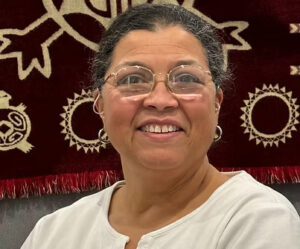
Marcella “Marty” Perrano was the Indian Ed director for 25 years under a Title 5 Indian Education federal grant For the Mahwah & Suffern school districts. She taught history and culture to Ramapough students on reclaiming native culture with crafts, storytelling, history, and self-pride. Though now retired, Marty still enjoys working with children doing native programs and has continued working with some local schools. Marty is also passionate about her work protecting local burial grounds.
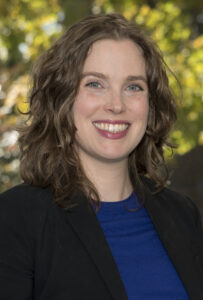
Sarah Koenig is Associate Professor of American Studies at Ramapo College, where she teaches courses in Native American history, the American West, and anthropology of religion. She also serves as Project Director for a three-year Humanities Initiatives grant from the NEH. Dr. Koenig earned a joint Ph.D. in History & Religious Studies from Yale in 2015. She published her first book, Providence and the Invention of American History in 2021. Her next book will explore the concept of the pioneer in US history and what pioneer mythology reveals about race, religion, and Manifest Destiny in America.
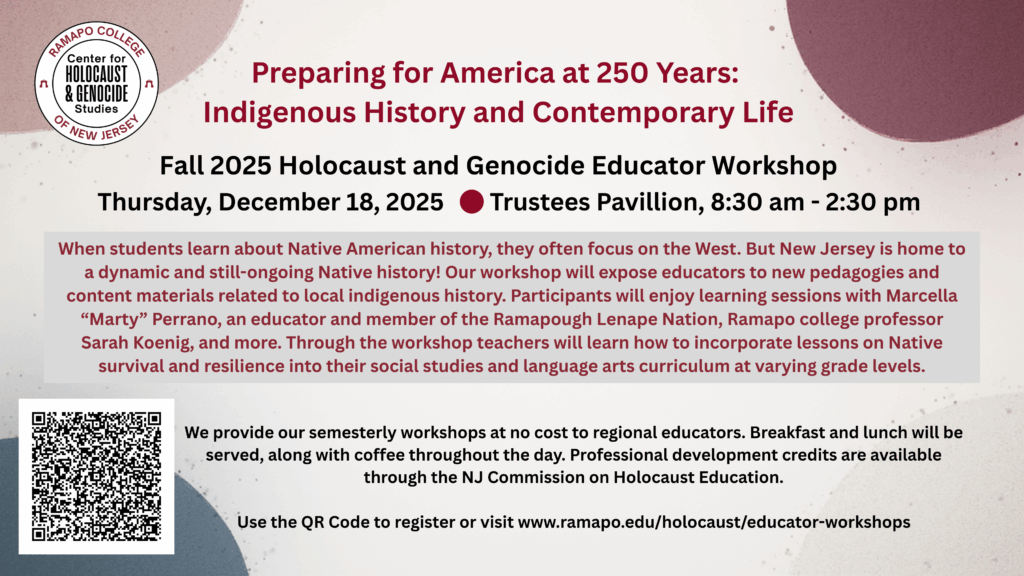
Teacher Roundtable
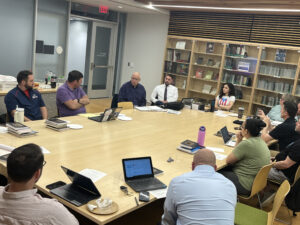
Graduating senior, Stefanie Viera, presents her research on transitional justice after the Guatemalan Genocide—conducted with Dr. Labendz—to our roundtable.
Our Teacher Roundtable, launched last year with much success, brings a small cohort of teachers to campus three times during the academic year. The program offers an opportunity to reflect on the opportunities and challenges we face in teaching about the Holocaust, genocide, human-rights, and belonging. We create an environment where teachers can speak freely and benefit from each other’s wise counsel. We hope, in 2025-2026, to organize a campus visit for the students of roundtable participants. Email Pedagogy Programs Administrator, Colleen Tambuscio (ctambusc@ramapo.edu), if you are interested in joining our roundtable.
Welcome Colleen Tambusico
Pedagogy Programs Administrator
As Pedagogy Programs Administrator, Colleen Tambuscio will oversee the expansion of the services that we provide to schools and educators in our region. She will:
- Facilitate our semesterly Holocaust and Genocide Educator Workshops
- Hold roundtable discussions with local educators
- Visit schools to provide specially tailored programs for faculty and students
- Help us develop a certificate program for teachers (and others) who want to expand their knowledge and capacity to teach the Holocaust and genocide
To contact Colleen to explore how we can work together, email ctambusc@ramapo.edu
Colleen Tambuscio comes to Ramapo with thirty-eight years of teaching experience. She began her career teaching the deaf for Bergen County Special Services and first taught Holocaust education to her deaf students for seventeen years. She continued her career at New Milford High School in Bergen County, New Jersey for 22 years. During her teaching career, she developed a semester-long Holocaust course and annually travelled to the U. S. Holocaust Memorial Museum for a two-day seminar with students. Since 1998, she has taken students to Germany, Czech Republic, and Poland to study the Holocaust accomplishing twenty-one student trips.
In 1998, Colleen was named as a Mandel Fellow at the U.S. Holocaust Memorial Museum (currently Museum Teacher Fellow) and has served as a U.S. Holocaust Memorial Museum Regional Museum Educator since 2002. Since 2002, Colleen has been a board member of the RCNJ Center for Holocaust and Genocide Education. Colleen earned an MA in Jewish-Christian Studies and Holocaust Education from Seton Hall University in 2006. In 2010, she traveled to Nahariya, Israel with the UJA Federation’s Partnership 2000 Program to develop a dialogue between Israeli and her own public high school students. She is the founder and President of the New Jersey Council of Holocaust Educators, a national professional-development organization for educators interested in teaching the Holocaust and genocide. In 2015, Colleen worked with Alexandra Zapruder, author of Salvaged Pages: Young Writers’ Diaries of the Holocaust, to create a multimedia edition of the book and lessons associated with the diaries which are housed on the Facing History and Ourselves website. Colleen was honored by Princeton University in 2017 as a Distinguished New Jersey Secondary Teacher. In October of 2021, she was appointed by Governor Murphy to the New Jersey Commission on Holocaust Education.
Collaboration with Regional Schools
If you are interested in working with the Center, please email holgen@ramapo.edu.
Educator Roundtable: Teaching the Holocaust and Genocide
The Holocaust and Genocide Education Roundtable will develop a cohort of specially selected educators dedicated to teaching about the Holocaust, genocide, and human rights in our region. Educators will be invited to participate in three 150-minute meetings over the course of the school year. We aim to facilitate discussions of best practices and resource sharing. Teachers will have the opportunity to identify, and to discuss real-world challenges, concerns, and visions. The CHGS will provide tailored feedback and support to assist educators in improving the education in their classrooms, schools, and districts. We look forward to including teachers from the eleven school districts that have partnered with the RCNJ Teacher Education Program.
Building Virtual Exhibits / Exploring Digital Humanities in Video Games
Video game technology is the foundation of many experiences today and in the future. Students that have grown up with video games have developed a unique skillset that empowers them to create content and experiences accessible to millions of people worldwide. Join this hands-on workshop to learn how video game platforms like Fortnite can be used by students to produce digital humanities experiences. Experts from Cleverlike Studios will guide educators through free online learning content published by Epic Games specifically for secondary and post-secondary educators. No gaming experience required. Cosponsored by the Digital Humanities Program and the Center for Holocaust and Genocide Studies at Ramapo College.
Survivor Story Maps with Beth Haverim Shir Shalom
The Center and our intern, Maddie Zech, worked with the Religious School at Congregation Beth Haverim Shir Shalom in Fall 2023 and Spring 2024. We adapted the Story Map project that Center Director Dr. Jacob Labendz developed for the students in his Fall 2022 course on the history of the Holocaust. That project culminated with a moving presentation at Congregation Beth Haverim Shir Shalom, which deepened our strong ties to that community. This program, similarly, culminated in a presentation by BHSS students at Ramapo College
Thanks to the success of our 2023-2024 project and to the assistance of our intern, Bella Apgar, we are currently running it again with a new cohort of students at BHSS.
Survivors of the 1994 Genocide of Tutsi in Rwanda at Mahwah High School
Providence Umugwaneza and Erick Nkurunziza will speak to MHS students about their lives before, during, and after the genocide, which took place 30 years ago.
Individualized Pedagogy Workshop for Ramapo Indian Hills High School
The Center offered a pedagogy workshop for the teachers of Ramapo Indian Hills High School on January 8, 2024.
Antisemitism and Islamophobia Discussion for the Academy of the Holy Angels
The Center provided a panel discussion on Antisemitism and Islamophobia, featuring GC Director Dr. Labendz and Asad Dandia, for the Academy of the Holy Angels in Bergen County on March 14, 2024.
Past Educator Workshops
Educator Workshop, Spring 2045
“Belonging: Reconsidering Antisemitism, Islamophobia, and other Racisms”
This semester’s workshop featured discussions with Ben Lorber, Senior Research Analyst at Political Research Associates, and CHGS Director Jacob Ari Labendz. Both scholars have developed belonging- and solidarity-centric approaches to studying and responding to racism, antisemitism, and Islamophobia. This contrasts with frameworks focused primarily on defining, naming, and shaming real and perceived manifestations of bigotry—frameworks which have failed to meet the present moment and which may even have exacerbated the problems we face together.
“Indigenous History & the American History Textbook Project”
This workshop offered participating educators hands-on experience with Ramapo College’s American History Textbook Project, which uses a growing collection of textbooks to teach students about historiography and how the stories we have told ourself about the USA have changed over time. Our focus, supported by Ramapo professor Sarah Koenig, was on Indigenous Americans and the genocides they endured.
Educator Workshop, Spring 2024
“Teaching and Exploring the Holocaust through Graphic Novels”
This workshop introduced teachers to the wealth of graphic novels that can be used to teach the history of the Holocaust, and to methodologies for employing them productively in class. Dr. Jessica Carr of Lafayette College led a fascinating discussion on the topic, which was followed by a pedagogy workshop with Colleen Tambuscio and Heather Lutz.
Special Workshop Series (2023-2024)
“The 1994 Genocide against Tutsis in Rwanda”
This April will mark the thirtieth remembrance of the 1994 Genocide against Tutsis in Rwanda. To assist educators in teaching about this tragedy, the Center at Ramapo College and the Holocaust Resource Center at Kean University have co-organized a three-part seminar series to be conducted virtually.
“Why Study the Holocaust Now?”
This is an inquiry becoming more pressing by the day. From the pervasiveness of book bans to the polarization of ideologies, from the current surge in antisemitic rhetoric to the propagation of misinformation and disinformation, it is clear that the present is a palimpsest of the past, one still susceptible to the dangers of discrimination, prejudice, and genocide. Our workshop, led by master educators Colleen Tambuscio and Heather Lutz, guided teachers through some of these profound issues, offering context, resources, lessons, and time for reflection with the aim not only to familiarize ourselves with one or more of these topics but also to converse about them in a collegial, collaborative setting. We benefited from an insightful and inspiring lecture by Dr. Davis Austin Walsh (Yale).
Resources from the workshop may be found here.
Educator Workshop, Spring 2023
“Entering Auschwitz and Approaching its Artifacts: A Virtual Tour and Discussion”
In the morning, Dr. Jerzy Wójcik—born in the town of Oświęcim (Auschwitz), Poland—took us on a personalized, virtual tour of Auschwitz. Heather Lutz and Colleen Tambuscio (Center Advisory Board) designed and led an afternoon workshop focused on strategies for teaching about the Holocaust and genocide through artifacts and featuring publicly available resources which can be integrated into the classroom without charge.
Copyright ©2026 Ramapo College Of New Jersey. Statements And Policies. Contact Webmaster.
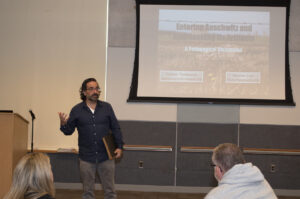
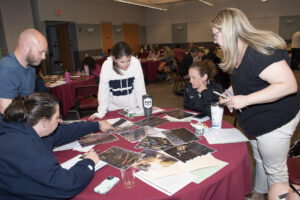
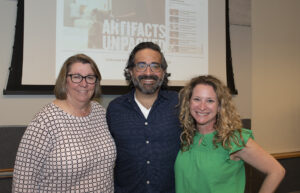
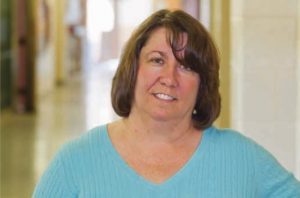
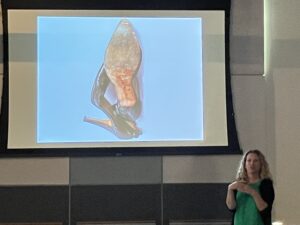
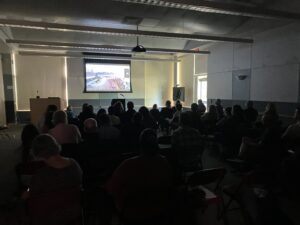

Follow Us!